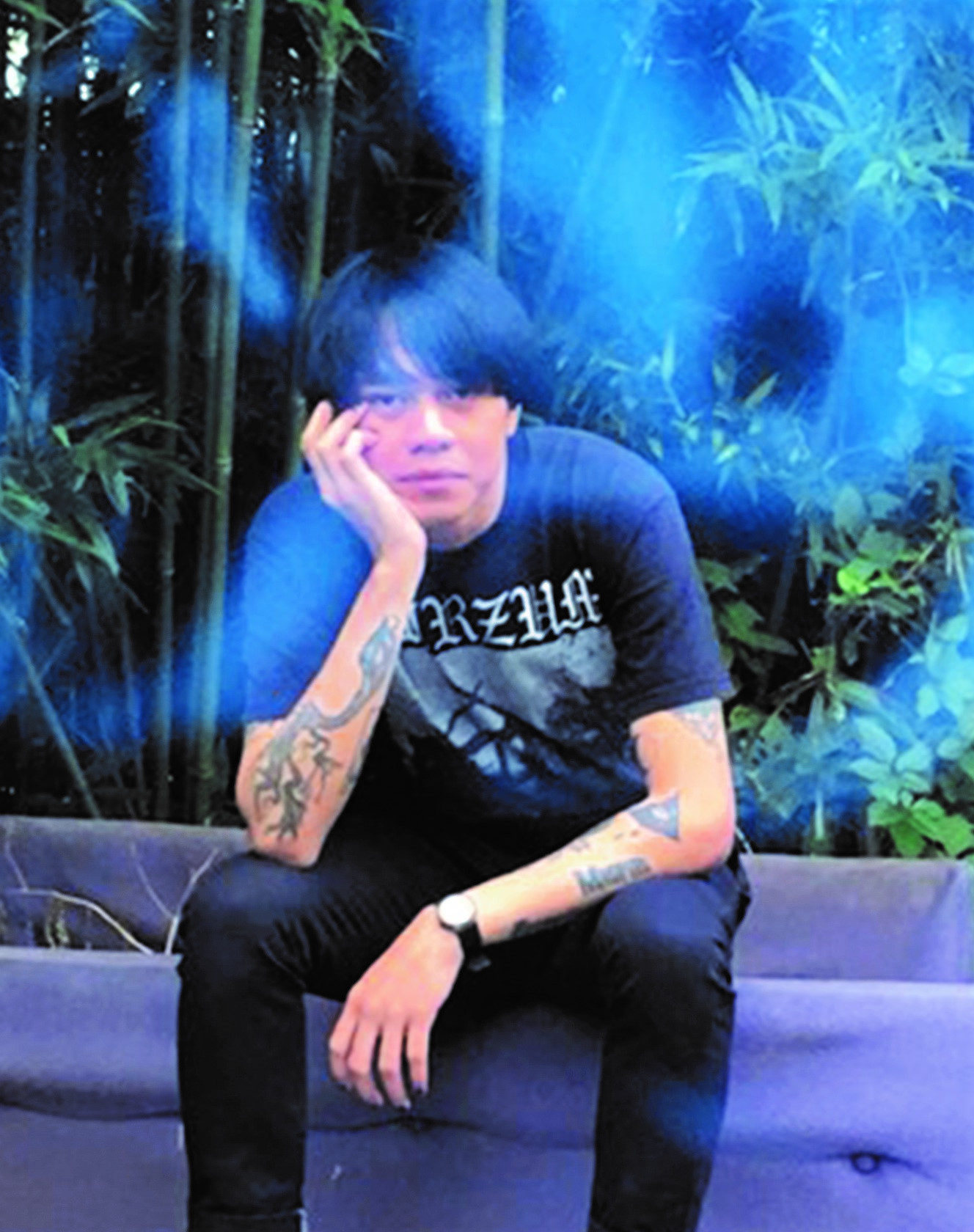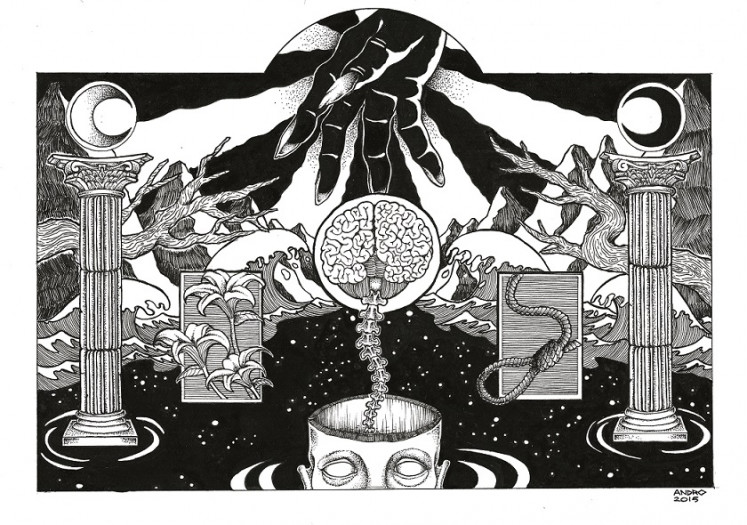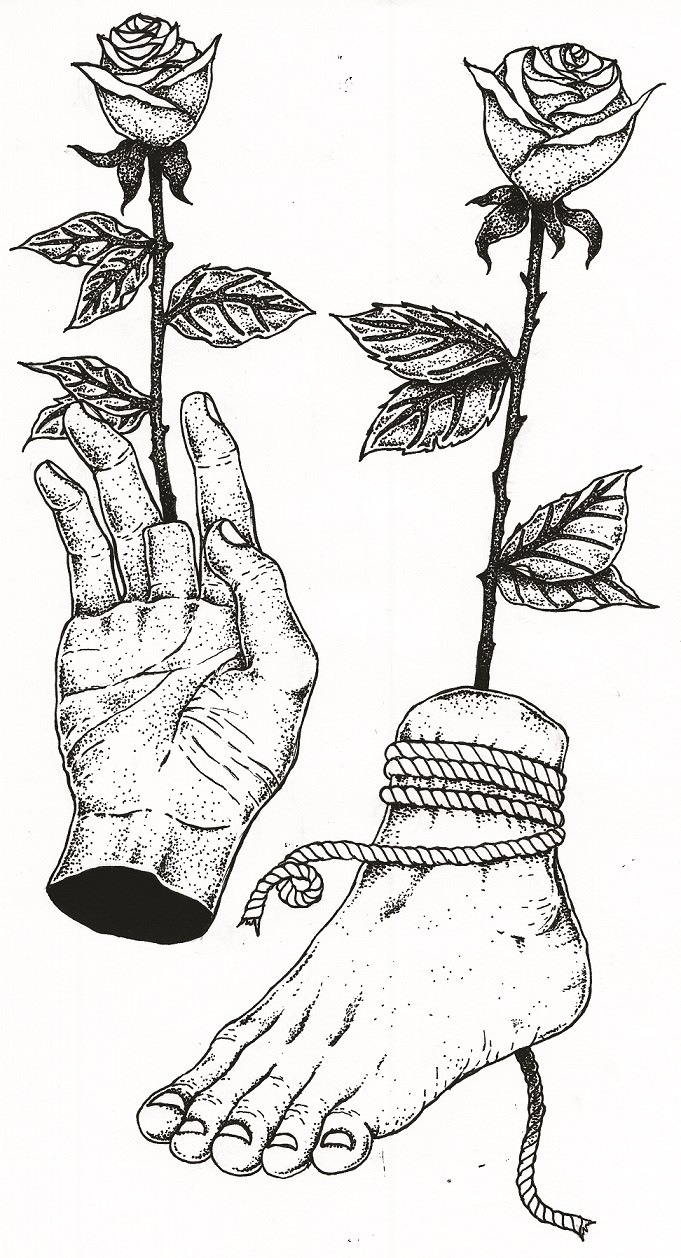Popular Reads
Top Results
Can't find what you're looking for?
View all search resultsPopular Reads
Top Results
Can't find what you're looking for?
View all search resultsAndro Kristian illustrates dark side of life through wicked humor
Illustrator Andro Kristian has been thinking about going back home to Indonesia but his artistic career has taken off professionally in Japan.
Change text size
Gift Premium Articles
to Anyone
I
ndonesian illustrator Andro Kristian has found his muse in Japan, not that he, at least on the surface, appears all too ecstatic about it.
The consciously dour-looking 31-year-old illustrator looks like a member of a Japanese goth-punk group circa late 1980s, presenting himself through monochromatic clothing, a hipster bowl-cut and a perpetually somber look.
Monochromatic: Illustrator Andro Kristian's drawings are mostly in black and white. (Andro Kristian/-)There is something humorous about it all, and this comes through in Andro's eye-catching drawings.
There is also something truly emotional about his work, which is masked by the element of humor.
The shield with which the illustrator guards himself with – the dark cynicism of his drawings, his sense of off-kilter trigger-warning humor, the silly meme posts – might make him an annoyance, but it also makes him, at the very least, an intriguing artist. Asked to describe his themes, he lists, “Life, death, religion. No politics. Oh wait, but religion is politics too”.
Having moved to Japan a few years ago, Andro's drawings have grown to infuse more of his existing sense of sorrow and dread.
Hanging by a thread: Andro's drawings have grown to infuse more of his existing sense of sorrow. (Andro Kristian/-)They are all monochromatic (mostly black and white), and they always depict bizarre situations involving death and decay. This was not what his parents – both law professionals – had envisioned of him.
Japan, it only makes sense. Andro's drawings are strongly reminiscent of the country's influential ero guro (erotic gore) genre of Japanese manga (comics), which focus on the disturbing and grotesque side of humanity and the universe.
Andro himself cited massively influential cult artists Takato Yamamoto and Suehiro Maruo as influences, alongside western artists Pushead (Brian Schroeder), Aubrey Beardsley and Harry Clarke (he also has references to novelist Edgar Allan Poe and film director Dario Argento).
For a while, he even worked at the popular hobbyist shop Mandarake in Tokyo. He has since gone a long way as an artist, creating illustrations for clients such as musicians and commission work for others. He also actively takes part in hobby and art exhibitions and events in Tokyo, where he currently resides.
Feeling like an outsider, Andro's initial attempt at pleasing his parents and going to law school lasted barely a year, and soon enough he focused on his creative side – taking a job at a local design agency.
There, he began honing what he calls his “nonsensical black and white illustration” style, with images that evoke occultism and darkness.
As is his self-deprecating wont, he says his approach was to create something that “felt like it had depth, but it doesn't, really”.
“People have said my pictures look like they are filled with symbolism, but that's not really true. People have also said that they look unnatural and inhumane, as well as stiff. Which is all fine and well for me – if you want natural and real, there's photography for that.”
Whether natural or not, Andro utilizes the common artist focus on negative space. He has toned down on utilizing the more ghoulish aspect of his pieces, using fewer skeletons for instance and relying more on the overall sense of layout.
Regardless of objects and subjects, Andro does concede that his obsession with the grimmer side of things does express his own attempts at battling his own pessimism.
“In a way, I depict a lot these unfortunate events – sorrow and death – and try to infuse something that can say, 'Bad things happen and there's nothing to be done about that.’ So just move on and learn to live with it. There is nothing to undo.”
Acceptance, even the misfortunes of others (or of oneself), is something that he feels works well in dealing with negative situations. He used as an example seeing someone trip and holding back the temptation to laugh.
“That person is still going to be someone who already fell, no matter whether you laugh at them or not. Laughing is good, just let it out. I know that sounds evil, I can't deny that. But at least I am honest with myself. When people tell me, 'What if it was someone you knew who fell?' Well, we'll cross that bridge when we get to it.”
As such, Andro also avoids that feeling of expecting his audience to react a certain way to his drawings. Instead, he prefers seeing how different people come up with different takes – and expressions – when seeing something he's created.
“What's important is people get into it without me having to say what it's about, or how they should react. Let them react the way they would naturally do. I just enjoy it,” he said.
He added he was surprised at how many people he thought would dislike his pieces. Instead, they have become fans, visiting his booth and hobby events and buying his prints.
Still, Andro's Japan days might be numbered. He is trying to tone down his Japanese influences because that would be contextually redundant, and he is working at a design agency where his colleagues are workaholics; all the while he’s keeping busy selling and producing his own merchandise set.
He has thought about going back to his homeland, but his career has taken off professionally in Japan, through the country's artistic network.
“It has opened up a lot of doors such as the many events I take part in, the artists I have met, the musicians and the clients,” he said. “If I were back home, admittedly I might not have all of those things.”













